HOW TO APPROACH CLASSES A Guide To Getting The Most Out Of Your Classes And Lectures
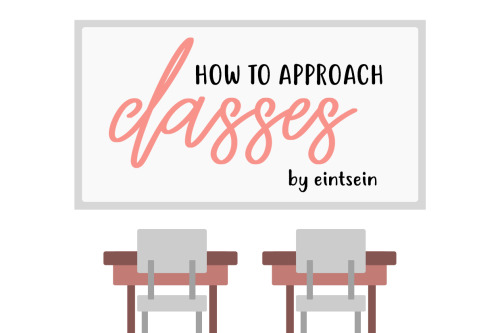
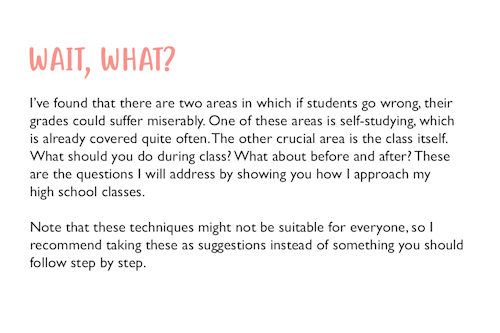
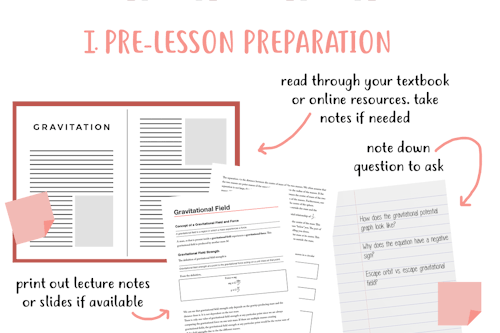
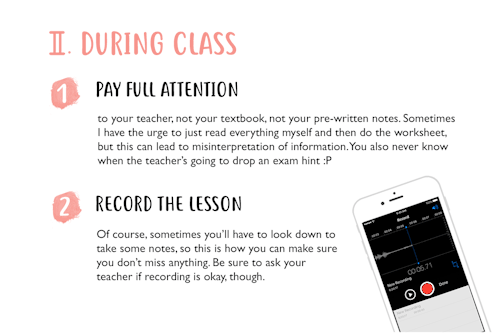
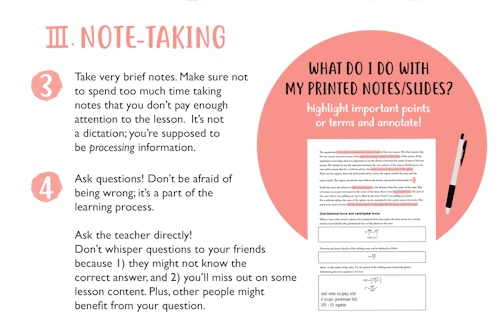
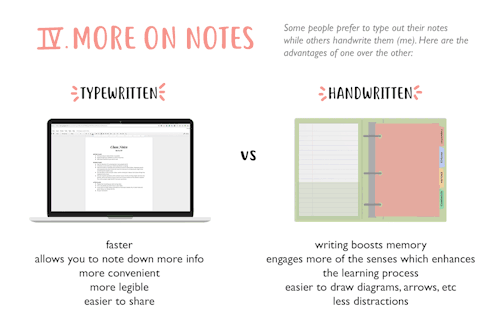
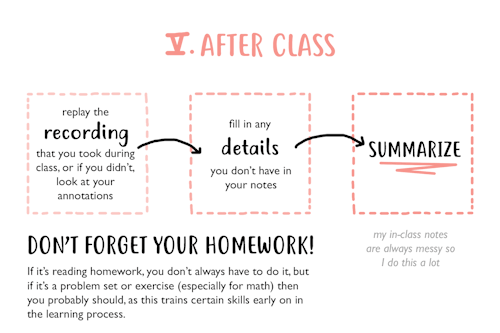
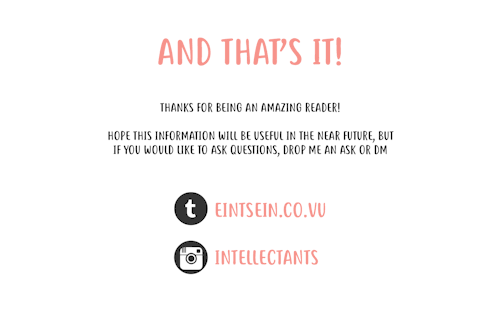
HOW TO APPROACH CLASSES A guide to getting the most out of your classes and lectures
By Eintsein
Design inspired by this post by @journalsanctuary
More Posts from Swirlspill-study and Others
Where do you recommend getting textbooks from? (renting, buying, online etc)
well textbook companies are evil and sometimes you have no choice but to buy a textbook new, but for other times where that’s not the case i’d recommend you check out slugbooks! ^_^ they compare a bunch of different sites selling the textbook you need so you can find it at the cheapest price :) it’s like the kayak of academia lol!
This website is helpful, especially if you’re new to academic writing! You can select what section of your study you’re writing about and then it provides you with example phrases for different parts of that section. I find this super useful when I feel like I’m repeating myself or I know what results I want to describe but I don’t know how to say it. Here’s an example below:


hey!! so a lot of us are interested about space but don’t know how to go about studying about it, this is a masterpost for all of those people who wish to learn about the universe <3
learn!!!
astronomy crash course
space + nasa news
bbc space
nasa space place
best space documentaries
best space books + sci-fi
best science + tech podcasts
posts + fun stuff!!
how we’d live on mars infographic
my space tag on my main blog!! [actually my url means space in maltese B-)]
the nasa instagram which is my fav!!!
nasa shop
nasa website yo!!!
spatial tunes
fav space app!!!!
25 best space movies
spatial studyspo here
my masterposts
notes, studying, and self-study resources
self-study resources
supplies
igcse resources
improving your handwriting
how to studyblr
literature masterpost
organisation
aesthetically pleasing notes
annotating
studying a foreign language
really great apps
math
college + uni
motivation
biology
+ more
hope this helps!!! feel free to come talk to me about space anytime <3

as requested by quite a few people - a masterpost of educational podcasts. links go to either the site or the itunes podcast store. an excerpt of the description is included with each.
* indicates a podcast that i listen to regularly
entertainment
*welcome to night vale - twice-monthly updates for the small desert town of night vale
*muggle cast - everything harry potter
general information
radiolab - investigation told through sounds and stories, and centered around one big idea
*stuff you should know - about everything from genes to the galapagos
*stuff mom never told you - the business of being women
tedtalks
good job, brain - part pub quiz show, part offbeat news
news
no one knows anything - the politics podcast from buzzfeed news
wait wait…don’t tell me - weekly current events quiz
college
*college info geek - the strategies and tactics the best students use
*getting in - your college admissions companion
math
math for primates - a couple of monkeys who decided that arguing about mathematics was a better use of their time than throwing poo at one another
math mutation - fun, interesting, or just plain weird corners of mathematics
science
60 second health - latest health and medical news
the naked scientists - interviews with top scientists, hands-on science experiments
60 second science - the most interesting developments in the world of science
startalk - astronomy, physics, and everything else about life in the universe
nasa science cast - science behind discoveries on earth, the solar system, and beyond
history
*myths and legends - myths, legends, and folklore that have shaped cultures
stuff you missed in history class - the greatest and strangest stuff you missed
the podcast history of our world - from the big bang to the modern age! …eventually
witness - the story of our times told by the people who were there
the history chicks - two women. half the population. several thousands years of history.
entrepreneurship & finances
practical money matters - better managing their finances
the internet business mastery - learn how to create an internet based business
social triggers insider - the fields of psychology and human behavior
listen money matters - honest and uncensored, this is not your father’s boring finance show
writing & literature
professional book nerds - it’s our job to discuss books all day long
a way with words - words, language, and how we use them
grammar girl - short, friendly tips to improve your writing
classic poetry aloud - recordings of the greats poems of the past
language
esl (english) - improve english speaking and listening skills
language pod
coffee break
search in your podcast app for specific languages!
art
99% invisible - exploration of the process and power of design
tips and tricks photography
the arts roundtable
hobbies & other
stash & burn (knitting)
practical defense - staying safe in our increasingly dangerous urban environments
zen and the art of triathlon - a triathlete’s view on living the multisport life
the art of charm - make you a better networker, connecter, and thinker
the indoor kids - isn’t just about video games, isn’t not about video games
rationally speaking - explore the borderlands between reason and nonsense
the dice tower - board games, card games, and the people who design and play them
motivational & inspirational
back to work - productivity, communication, work, barriers, constraints, tools, and more
personal growth podcast - classic and contemporary self development audio
what it takes - conversations with towering figures in almost every field
here be monsters - exploring the dark corners of the human mind
on being - the big questions of meaning with scientists, theologians, artists, teachers

The basics of Research Methods. There’s so much to learn in AS and more is added in the second year. In an exam you could be asked to state which hypothesis is being used in an example, which experimental method would be best for a situation, or to create your own research plan.
How to Study Like a Harvard Student
Taken from Sophia Chua-Rubenfeld, daughter of the Tiger Mother
Preliminary Steps 1. Choose classes that interest you. That way studying doesn’t feel like slave labor. If you don’t want to learn, then I can’t help you. 2. Make some friends. See steps 12, 13, 23, 24. General Principles 3. Study less, but study better. 4. Avoid Autopilot Brain at all costs. 5. Vague is bad. Vague is a waste of your time. 6. Write it down. 7. Suck it up, buckle down, get it done. Plan of Attack Phase I: Class 8. Show up. Everything will make a lot more sense that way, and you will save yourself a lot of time in the long run. 9. Take notes by hand. I don’t know the science behind it, but doing anything by hand is a way of carving it into your memory. Also, if you get bored you will doodle, which is still a thousand times better than ending up on stumbleupon or something. Phase II: Study Time 10. Get out of the library. The sheer fact of being in a library doesn’t fill you with knowledge. Eight hours of Facebooking in the library is still eight hours of Facebooking. Also, people who bring food and blankets to the library and just stay there during finals week start to smell weird. Go home and bathe. You can quiz yourself while you wash your hair. 11. Do a little every day, but don’t let it be your whole day. “This afternoon, I will read a chapter of something and do half a problem set. Then, I will watch an episode of South Park and go to the gym” ALWAYS BEATS “Starting right now, I am going to read as much as I possibly can…oh wow, now it’s midnight, I’m on page five, and my room reeks of ramen and dysfunction.” 12. Give yourself incentive. There’s nothing worse than a gaping abyss of study time. If you know you’re going out in six hours, you’re more likely to get something done. 13. Allow friends to confiscate your phone when they catch you playing Angry Birds. Oh and if you think you need a break, you probably don’t. Phase III: Assignments 14. Stop highlighting. Underlining is supposed to keep you focused, but it’s actually a one-way ticket to Autopilot Brain. You zone out, look down, and suddenly you have five pages of neon green that you don’t remember reading. Write notes in the margins instead. 15. Do all your own work. You get nothing out of copying a problem set. It’s also shady. 16. Read as much as you can. No way around it. Stop trying to cheat with Sparknotes. 17. Be a smart reader, not a robot (lol). Ask yourself: What is the author trying to prove? What is the logical progression of the argument? You can usually answer these questions by reading the introduction and conclusion of every chapter. Then, pick any two examples/anecdotes and commit them to memory (write them down). They will help you reconstruct the author’s argument later on. 18. Don’t read everything, but understand everything that you read. Better to have a deep understanding of a limited amount of material, than to have a vague understanding of an entire course. Once again: Vague is bad. Vague is a waste of your time. 19. Bullet points. For essays, summarizing, everything. Phase IV: Reading Period (Review Week) 20. Once again: do not move into the library. Eat, sleep, and bathe. 21. If you don’t understand it, it will definitely be on the exam. Solution: textbooks; the internet. 22. Do all the practice problems. This one is totally tiger mom. 23. People are often contemptuous of rote learning. Newsflash: even at great intellectual bastions like Harvard, you will be required to memorize formulas, names and dates. To memorize effectively: stop reading your list over and over again. It doesn’t work. Say it out loud, write it down. Remember how you made friends? Have them quiz you, then return the favor. 24. Again with the friends: ask them to listen while you explain a difficult concept to them. This forces you to articulate your understanding. Remember, vague is bad. 25. Go for the big picture. Try to figure out where a specific concept fits into the course as a whole. This will help you tap into Big Themes – every class has Big Themes – which will streamline what you need to know. You can learn a million facts, but until you understand how they fit together, you’re missing the point. Phase V: Exam Day 26. Crush exam. Get A.
Coding Masterpost
Hey buddies guess what??
I’ve brought you some awesome links that I have for learning how to code, computer science posts, and also various things about hacking. :p
CODING / COMPUTER SCIENCE
www.udemy.com
The best free and paid classes on the web. This is my go to site for learning something new.
app.pluralsight.com
$40 a month but the courses are top tier. You might find a free trial from microsoft dev essentials…
http://ocw.mit.edu/index.htm
Free MIT courses with video lectures, notes, and resources!!!
https://www.codecademy.com/learn
Perhaps the most famous site for learning how to code, this is must have for any aspiring computer scientist, web dev, or programmer. A smooth UI, dozens of courses, APIs, and fun quizzes if you decide to cough up a bit of money. $19 is crazy dirt cheap compared to some $200 courses out there on the web.
https://thenewboston.com/
Dubbed by its creator as the social network for programmers, TNB is a hotbed of hundreds of video tutorials for programming and computer science, as well as other disciplines like cooking.
http://www.tutorialspoint.com/codingground.htm
Another crazy important site for anyone serious about programming. You can find online terminals, IDEs, and tutorials for almost every popular language out there, from oCaml to lisp
http://codecombat.com/
Geared towards children, this is a good introudction to programming thinking and helps a younger audience get into the problem solving mindset.
http://www.codewars.com/dashboard
For users with some coding experience, codewars offers hundreds of challenges in various languages and help them build up their skills. Perfect for intermediate to master programmers.
https://www.codingame.com/start
This site is a bit geared towards new coders, it’s still fun and helps a ton in developing confidence.
http://jonisalonen.com/
Random blog that discusses some concepts regarding computer science. Worth a read if you’re ever lost and wanna just reflect on something.
http://howtonetwork.net/
https://www.howtonetwork.com/
Both the old and new sites are still up and provide their services for learning IT skills.
http://www.freeprogrammingresources.com/
RESOURCES FOR COMPILERS, DATABASES, FORUMS, and SO MUCH MORE TAKE A LOOK.
http://www.hloom.com/modern-resume-templates/
What good is a programmer if they can’t make a good resume to show off their skills? With these helpful templates you can impress your potential employer.
http://freecomputerbooks.com/
I haven’t used this so be cautious. Has a lot of ebooks.
http://i.imgur.com/i3jtrA0.jpg
Web development cheat sheet.
http://hackforums.net/showthread.php?tid=626170
Awesome intro to programming with links to projects.
http://www.elithecomputerguy.com/
Eli has a blog and also videos for various things.
http://www.net130.com/ccie/tech/Sybex%20-%20Cisco%20CCIE%20Book.pdf
CCIE book. Not sure if it’s open source. I’ll remove this link if requested.
https://www.codeschool.com/
pay money, learn to code. seems legit.
http://www.python-forum.org/
A forum for Python usrers! There are only a few sections but there are enough posts on here so if you haev a question, it might have already been asked.
http://www.dreamincode.net/
Another sweet forum that covers multiple topics.
http://forums.devshed.com/
A really popular forum! Lots of languages and users, dozens of topics.
http://www.codingforums.com/
Another large forum, perfect for any use.
http://www.programmingforums.org/
A freaking large factory of forums you will never find the same post twice.
http://www.gamedev.net/page/index.html
Lots of forums, jobs, and helpful resources all geared towards game development.
http://stackoverflow.com/
The most famous one imo. Be wary friend, don’t let your CS teacher find this in your browser history.
http://forum.codecall.net/
Resources, forums, tutorials, blow yourself out here.
https://openhatch.org/
Has some training missions and other stuff. Helps you find projects to work on.
https://codefights.com/
Put your skills to the test against AI or humans.
www.datacamp.com
Like big data? Well this site teaches you Python, the numpy library, and R.
https://www.edx.org/
Full of courses for anything.
http://www.exactas.org/modules/UpDownload/store_folder/1_-_COMPUTACION/Jonathan%20Bartlett%20-%20Programming%20From%20The%20Ground%20Up.pdf
handy book on progrmaming.
HACKING
http://null-byte.wonderhowto.com/
This is one of the BEST websites to learn about security and you can follow tutorials by real hackers and members of the IT field. With a strong community full of experienced authors, you will either flourish by using proper grammar or be mocked for asking “how do i hack gmail??”
www.hackerhighschool.org/home.html
PERFECT FOR HIGH SCHOOL STUDENTS INTERESTED IN CYBERSECURITY BUT HAVE NO IDEA WHERE TO START. I CANNOT STRESS HOW AWESOME THIS SITE IS.
allison.com
ANOTHER PERFECT SITE FOR LEARNING ANYTHING
http://null-byte.wonderhowto.com/how-to/links-help-you-hacking-0162359/
Small collection of resources for educating yourself on internet security.
http://directory.umm.ac.id/Networking%20Manual/Networking%20For%20Dummies%207%20Ed%202004.pdf
A must read for anyone with a desire to get into IT
http://cli.learncodethehardway.org/book/
Crash course on Command line.
https://www.cybrary.it/
Great if you cannot afford pricy online classes. Instructors know what they are talking about and despite a few poor quality videos, you will be supplied with helpful resources and forums.
https://evilzone.org/
One of the better forums out there for learning. Delve into it at your own risk.
https://v3rmillion.net/
ROBLOX hacking, general exploits, or just normal discussions. Roblox helped put me on my path to coding and I love how every day, millions of kids are being taught the ability of coding thanks to its studio.
https://www.hackthissite.org/pages/index/index.php
Lessons, challenges, forums, and resources all bundled in a site to hone your pentest skills.
http://www.enigmagroup.org/
Like hackthissite, but with a different UI
https://www.hellboundhackers.org/
Read the above
https://pentest-tools.com/home
Free pentest tools. Don’t use it for anything wrong.
https://www.defcon.org/
Hehe..we are in defcon 4..
https://picoctf.com/learn
Capture the Flag learning site. Amazing imo.
http://overthewire.org/wargames/
Another war games site. You get various challenges that are fun to solve ^.^
http://hakipedia.com/index.php/Hakipedia
Wikipedia but for security.
http://smashthestack.org/
Wargames.
http://www.wablab.com/
Compete against IT pros. Git rekt code-bug
http://academy.ehacking.net/courses/computer-hacking-forensics-investigation/
Explore this site a bit.
https://www.ethicalhacker.net/features/book-reviews/the-basics-of-rootkits-leave-no-trace
The link kinda gives it away.
https://github.com/mrrrgn/simple-rootkit/blob/master/README.md
Fun little project.
http://www.fuzzysecurity.com/tutorials.html
Professional blog that has tutorials and highly detailed information.
https://www.corelan.be/index.php/2009/07/19/exploit-writing-tutorial-part-1-stack-based-overflows/
Ahh read the above please!
https://trailofbits.github.io/ctf/index.html
A CTF guide. Pretty well written and has slides. Awesome resources. What else can I say?
http://www.securitysift.com/windows-exploit-development-part-1-basics/
Another swell blog.
http://www.thegreycorner.com/2010/01/beginning-stack-based-buffer-overflow.html
Woa..another..awesome blog..there are too many to count!
http://www.flexhex.com/docs/howtos/hex-editing.phtml
Hey kid? Wanna learn how to hex edit like a b0ss?
https://www.blackhat.com/presentations/bh-usa-03/bh-us-03-willis-c/bh-us-03-willis.pdf
Nice little pdf for forensics.
www.greyhathacker.net
A blog that’s a bit dated but has useful information.
xeuhack.com
Dated but useful blog.
www.cybersecuritycourse.co
haven’t tried this yet but it has great reviews.
www.censys.io
Search engine for data scientists.
http://www.techexams.net/forums/off-topic/51719-best-security-websites.html
Best sites to learn from.
http://resources.infosecinstitute.com/ebooks/
Awww yiss ebooks
http://bookboon.com/en/it-programming-ebooks
Might run into errors downloading books.
http://ebook-dl.com/
Full books that are virus free.
That’s all for now! Special thanks to everyone who suggested I make this!
hello!! if u are applying to grad school (humanities or STEM!) & u
are trying to save money on application costs
are interested in programs that care abt saving u money on application costs
are interested in programs that are aware of the fact that the GRE tells them nothing of use about your academic abilities
this site may be useful to you as you decide where to apply :-)
the thesis progress journal
it’s all based on louise desalvo’s concept of a process journal for writers, from her book ‘the art of slow writing’ which i read way back in 2014 but has stayed with me all this time. she based that concept on sue grafton’s journal, which “stands as a record of the conversation she has with herself about the work in progress.” desalvo talks about her own process journal : “to plan a project, list books i want to read, list subjects i want to write about, capture insight about my work in progress, discuss my relationship to my work (what’s working and what’s not, whether i need to make changes to my writing schedule, how i’m feeling about the work)”
her view of the concept is so interesting and can easily be applied to grad school : “keeping a process journal helps us understand that our writing is important work. we value it enough to plan, reflect, and evaluate our work. a process journal is an invaluable record of our work patterns, our feelings about our work, our responses to ourselves as writers, and our strategies for dealing with difficulties and challenges.”
she says, and i quote : “our progress journals are where we engage in the nonjudgmental, reflective witnessing of our work. here, we work at defining ourselves as active, engaged, responsible, patient writers.” and like ???? yes, go off louise!
every week i make an entry with my three to five priorities. since i currently still have seminars, my entire week cannot be dedicated to my thesis, so these priorities allow me to really focus on specific things. they can be bigger or smaller depending on the amount of time i have to work on my thesis.
every day i work on my thesis, i make an entry. i try to answer two questions : “what did i do that day to make progress on my thesis?” as well as “how am i feeling & what i can do to feel better?” i also choose two to five specific tasks to achieve that day and write about the progress. for example, if my task is reading an article, i’ll write it down, check the box once i do it and write a summary of the “experience” (how was the article, was it useful for my research, should i read more of that author’s work, etc.) that way, i can look back at previous tasks, know what happened and learn from it.
i also use the journal almost like a bullet journal (the OG kind) with ongoing lists of important things. of course, there are some to do lists here and there (even though i prefer having my comprehensive task list on todoist), but it’s mostly things like
names of people who have helped me so i can thank them in my thesis
call numbers of books to borrow or archives to consult
research hypotheses
things to look for in the archives i consult
questions to ask my professor/advisor/archivist/etc.
issues that need to be fixed in my thesis
books/articles to read
additional things to research
i also use it as a regular notebooks for all things thesis. one of my seminars this semester is a methodology course, so i take notes in my journal as reference. i also sometimes will write some reading notes if i don’t have my computer on me, such as key quotes or arguments. also, all of my notes from meetings/calls/emails with my advisor are put in the journal, as well as a any pertinent meeting notes (with an archivist, fellow student, my mom, etc.) lastly, sometimes it just becomes a catch all for brainstorm sessions and random thoughts.
for me, this thesis progress journal is the best way to take a step back from the actual work and reflect on what i’m doing, good or bad, and what i can do to make things better, but most importantly, it allows me to understand my progress.
-
 daniellaisaprincess liked this · 3 months ago
daniellaisaprincess liked this · 3 months ago -
 organised-kitty liked this · 4 months ago
organised-kitty liked this · 4 months ago -
 bobrisky liked this · 4 months ago
bobrisky liked this · 4 months ago -
 kennedypeterson liked this · 5 months ago
kennedypeterson liked this · 5 months ago -
 manchesther-studies reblogged this · 5 months ago
manchesther-studies reblogged this · 5 months ago -
 blorbpull liked this · 6 months ago
blorbpull liked this · 6 months ago -
 phantomyao liked this · 7 months ago
phantomyao liked this · 7 months ago -
 wreathofsmoke liked this · 8 months ago
wreathofsmoke liked this · 8 months ago -
 sprook-children liked this · 9 months ago
sprook-children liked this · 9 months ago -
 7herry liked this · 9 months ago
7herry liked this · 9 months ago -
 toaddafox liked this · 10 months ago
toaddafox liked this · 10 months ago -
 jovae-eagle liked this · 11 months ago
jovae-eagle liked this · 11 months ago -
 avto29 liked this · 11 months ago
avto29 liked this · 11 months ago -
 the-thoughtofyousnofuckenfun liked this · 1 year ago
the-thoughtofyousnofuckenfun liked this · 1 year ago -
 quietvoiceloudmind liked this · 1 year ago
quietvoiceloudmind liked this · 1 year ago -
 izziebeex liked this · 1 year ago
izziebeex liked this · 1 year ago -
 trapblossom liked this · 1 year ago
trapblossom liked this · 1 year ago -
 agirlwithglam liked this · 1 year ago
agirlwithglam liked this · 1 year ago -
 nefarious-virgo liked this · 1 year ago
nefarious-virgo liked this · 1 year ago -
 gunnar79 liked this · 1 year ago
gunnar79 liked this · 1 year ago -
 forsongqian liked this · 1 year ago
forsongqian liked this · 1 year ago -
 pisabookintown liked this · 1 year ago
pisabookintown liked this · 1 year ago -
 missdragonica liked this · 1 year ago
missdragonica liked this · 1 year ago -
 morgan-1444 liked this · 1 year ago
morgan-1444 liked this · 1 year ago -
 elberdiomeran liked this · 1 year ago
elberdiomeran liked this · 1 year ago -
 anprogvittoza liked this · 1 year ago
anprogvittoza liked this · 1 year ago -
 tholybelverous liked this · 1 year ago
tholybelverous liked this · 1 year ago -
 sandorcsudai liked this · 1 year ago
sandorcsudai liked this · 1 year ago -
 anpalizit liked this · 1 year ago
anpalizit liked this · 1 year ago -
 ivondagcu liked this · 1 year ago
ivondagcu liked this · 1 year ago -
 studioreader liked this · 1 year ago
studioreader liked this · 1 year ago -
 takajednaco liked this · 1 year ago
takajednaco liked this · 1 year ago
a study blog for collected references, advice, and inspiration
267 posts
